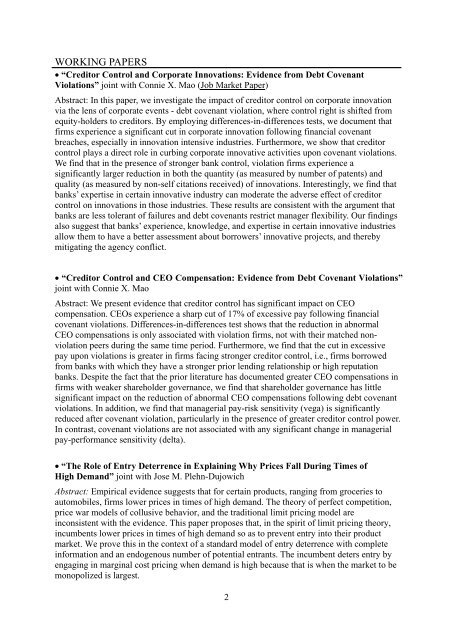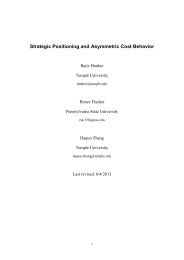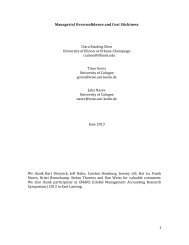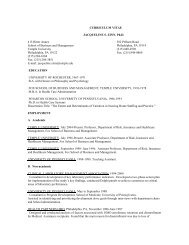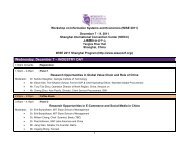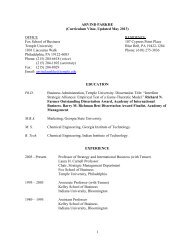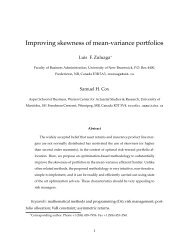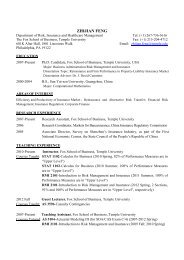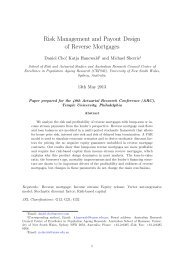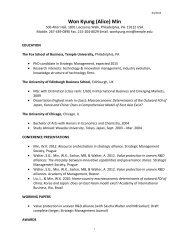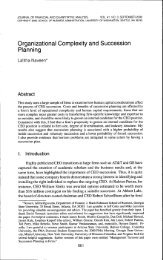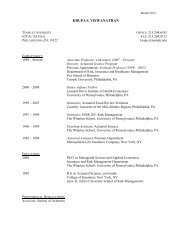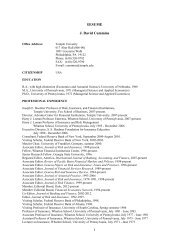George (Yuqi) Gu - Fox School of Business - Temple University
George (Yuqi) Gu - Fox School of Business - Temple University
George (Yuqi) Gu - Fox School of Business - Temple University
Create successful ePaper yourself
Turn your PDF publications into a flip-book with our unique Google optimized e-Paper software.
WORKING PAPERS<br />
• “Creditor Control and Corporate Innovations: Evidence from Debt Covenant<br />
Violations” joint with Connie X. Mao (Job Market Paper)<br />
Abstract: In this paper, we investigate the impact <strong>of</strong> creditor control on corporate innovation<br />
via the lens <strong>of</strong> corporate events - debt covenant violation, where control right is shifted from<br />
equity-holders to creditors. By employing differences-in-differences tests, we document that<br />
firms experience a significant cut in corporate innovation following financial covenant<br />
breaches, especially in innovation intensive industries. Furthermore, we show that creditor<br />
control plays a direct role in curbing corporate innovative activities upon covenant violations.<br />
We find that in the presence <strong>of</strong> stronger bank control, violation firms experience a<br />
significantly larger reduction in both the quantity (as measured by number <strong>of</strong> patents) and<br />
quality (as measured by non-self citations received) <strong>of</strong> innovations. Interestingly, we find that<br />
banks’ expertise in certain innovative industry can moderate the adverse effect <strong>of</strong> creditor<br />
control on innovations in those industries. These results are consistent with the argument that<br />
banks are less tolerant <strong>of</strong> failures and debt covenants restrict manager flexibility. Our findings<br />
also suggest that banks’ experience, knowledge, and expertise in certain innovative industries<br />
allow them to have a better assessment about borrowers’ innovative projects, and thereby<br />
mitigating the agency conflict.<br />
• “Creditor Control and CEO Compensation: Evidence from Debt Covenant Violations”<br />
joint with Connie X. Mao<br />
Abstract: We present evidence that creditor control has significant impact on CEO<br />
compensation. CEOs experience a sharp cut <strong>of</strong> 17% <strong>of</strong> excessive pay following financial<br />
covenant violations. Differences-in-differences test shows that the reduction in abnormal<br />
CEO compensations is only associated with violation firms, not with their matched nonviolation<br />
peers during the same time period. Furthermore, we find that the cut in excessive<br />
pay upon violations is greater in firms facing stronger creditor control, i.e., firms borrowed<br />
from banks with which they have a stronger prior lending relationship or high reputation<br />
banks. Despite the fact that the prior literature has documented greater CEO compensations in<br />
firms with weaker shareholder governance, we find that shareholder governance has little<br />
significant impact on the reduction <strong>of</strong> abnormal CEO compensations following debt covenant<br />
violations. In addition, we find that managerial pay-risk sensitivity (vega) is significantly<br />
reduced after covenant violation, particularly in the presence <strong>of</strong> greater creditor control power.<br />
In contrast, covenant violations are not associated with any significant change in managerial<br />
pay-performance sensitivity (delta).<br />
• “The Role <strong>of</strong> Entry Deterrence in Explaining Why Prices Fall During Times <strong>of</strong><br />
High Demand” joint with Jose M. Plehn-Dujowich<br />
Abstract: Empirical evidence suggests that for certain products, ranging from groceries to<br />
automobiles, firms lower prices in times <strong>of</strong> high demand. The theory <strong>of</strong> perfect competition,<br />
price war models <strong>of</strong> collusive behavior, and the traditional limit pricing model are<br />
inconsistent with the evidence. This paper proposes that, in the spirit <strong>of</strong> limit pricing theory,<br />
incumbents lower prices in times <strong>of</strong> high demand so as to prevent entry into their product<br />
market. We prove this in the context <strong>of</strong> a standard model <strong>of</strong> entry deterrence with complete<br />
information and an endogenous number <strong>of</strong> potential entrants. The incumbent deters entry by<br />
engaging in marginal cost pricing when demand is high because that is when the market to be<br />
monopolized is largest.<br />
2


